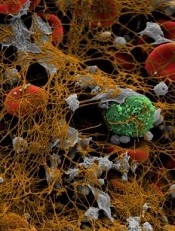
Image by Andre E.X. Brown
SAN DIEGO—A factor Xa inhibitor antidote can reverse the anticoagulation activity of rivaroxaban (Xarelto) in healthy subjects, results of a phase 3 study suggest.
The antidote, andexanet alfa, reversed the anti-factor Xa activity of rivaroxaban, reduced the level of free rivaroxaban in the plasma, and restored thrombin generation to within the normal baseline range.
Subjects did not experience any severe or serious adverse events, and they did not develop antibodies to factor X or Xa.
Alexander Michael Gold, MD, of Portola Pharmaceuticals, and his colleagues presented these results at the American College of Cardiology’s 64th Annual Scientific Session (abstract 912-08*).
The study, ANNEXA-R, is sponsored by Portola Pharmaceuticals, the company developing andexanet alfa.
ANNEXA-R is a randomized, double-blind, phase 3 study in which researchers are evaluating the safety and efficacy of andexanet alfa for reversing rivaroxaban-induced anticoagulation in healthy volunteers ages 50 to 75.
In the first part of the study, 41 subjects received rivaroxaban at 20 mg once daily for 4 days. They were then randomized in a 2:1 ratio to receive either an 800 mg IV bolus of andexanet alfa (n=27) or placebo (n=14).
Results showed that andexanet alfa reduced the anti-factor Xa activity of rivaroxaban from baseline to nadir by more than 90%, a statistically significant difference from placebo (P<0.0001).
Significantly more andexanet alfa-treated subjects (96%) than placebo-treated subjects (0%) had a 90% or greater reduction in anti-factor Xa activity from baseline to nadir (P<0.0001).
Andexanet alfa also reduced the free (unbound) rivaroxaban concentration significantly from baseline to nadir, compared with placebo (P<0.0001).
Endogenous thrombin potential significantly increased from baseline to peak in andexanet alfa-treated subjects compared with placebo-treated subjects (P<0.0001).
And 96% of andexanet alfa-treated subjects saw their thrombin generation return to the normal range within 10 minutes of completing treatment.
The researchers said andexanet alfa was well-tolerated. There were no serious or severe adverse events, no thrombotic events, and no antibodies to factor X or Xa.
For the second part of the ANNEXA-R study, researchers plan to treat 40 healthy volunteers with rivaroxaban at 20 mg once daily for 4 days.
Then, subjects will be randomized in a 2:1 ratio to receive either andexanet alfa administered as an 800 mg IV bolus followed by a continuous infusion of 8 mg/min for 120 minutes or to placebo. Data from this part of the study are expected in mid-2015.

*Information in the abstract differs from that presented at the meeting.

